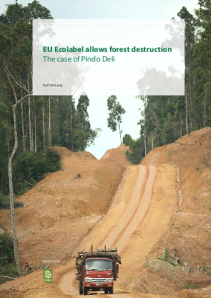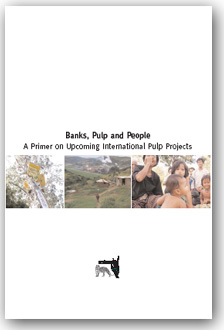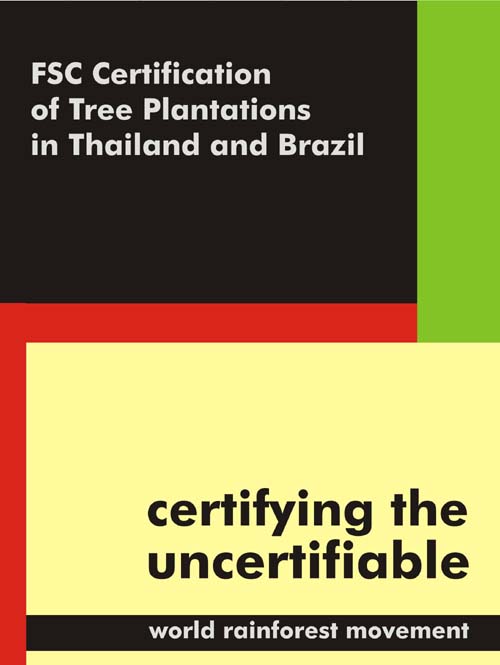A profile of the world’s biggest (and most notorious) forestry consulting firm.
By Chris Lang. Published in Pulping the Mekong, October 2003.
The role of forestry consultants is crucial in promoting industrial tree plantations and the expansion of the pulp and paper industry. Consulting firms study, plan, design and set up pulp and paper mills and plantation operations. They also play an important, but less publicly visible role in promoting such developments in the first place, for instance through their forecasts of ever expanding paper demand and their optimistic appraisals of the benefits (as opposed to the costs) of pulp and paper developments.
In 1977, Ken King, then-head of forestry at the United Nations Food and Agriculture Organising described “international clubs of consultants” which continually recommended large capacity pulp and paper mills to be built in countries that cannot afford to borrow the capital required for such developments.
Jaakko Pöyry is by far the largest and most influential of these forestry consulting firms. Company publicity materials from 1994 boast that Pöyry has
- “the business intelligence for assessing and developing project opportunities. The group has more than 300 experts throughout the world supporting forestry and forest industry management with facts, ideas and solutions. With these resources we can consider forestry and forest industry from a global perspective.”
Pöyry’s “global perspective” is precisely the problem. The expansion of the pulp industry in the South might make sense from a technocratic, Northern-based perspective. Factors such as cheap land, cheap labour, freely available subsidies and faster tree growth rates make plantations appear attractive. However, such considerations make little sense to villagers who see their lands and forests replaced by plantations which produce raw material for a product for which they have little or no use.
Founded in 1958 by Dr. Jaakko Pöyry, a pulp and paper engineer, the Jaakko Pöyry Group is a Finnish consulting and engineering group. Today Pöyry is the world’s largest forestry and engineering consulting firm, with 4,500 employees and a turnover in 2000 of around €474 million.
In 1985, Dr. Jaakko Pöyry sold half the company to Henrik Ehrnrooth, who became President and CEO. Ehrnrooth is now vice chairman, and since January 1999 Erkki Pehu-Lehtonen has been CEO. In 1995, Finvest plc, a Finnish development and investment company, bought the Jaakko Pöyry Group. Under the deal Pöyry’s shareholders and senior management gained control of 52 per cent of Finvest’s votes. The company was publicly listed on the Helsinki and Stockholm stock exchanges in 1997. The major shareholders in Jaakko Pöyry are Corbis SA (16.0 per cent), Geveles AB (7.3 per cent) and Porcurator Oy (4.1 per cent). Henrik Ehrnrooth, with his brothers Georg and Carl-Gustaf, holds indirectly a controlling interest in Corbis, Pöyry’s largest shareholder.
Pöyry has played a key role in promoting pulp mill operations, logging and fast-growing tree plantations in the South, and has carried out over 6,000 contracts in more than 100 countries including 300 major pulp and paper mill projects.
In 1978, Dr. Pöyry was responsible for the engineering work, wood supply planning and construction management for what was then the world’s largest single line pulp mill: Aracruz Cellulose in Brazil. Dr. Pöyry was also the consultant for the expansion of the mill in 1991. In 2000, the Jaakko Pöyry Group won a further contract for yet another expansion of the Aracruz mills.
Aracruz is involved in a joint venture with Stora Enso to build another huge pulp mill in Brazil. In 1996, Jaakko Pöyry once again won a contract with Aracruz to produce an environmental impact assessment of the Veracel pulp mill and its associated plantations. In 2001, Pöyry produced a feasibility study for the pulp mill.
Jaakko Pöyry began working in South East Asia in the early 1970s and played a key role in setting up deals in the pulp and paper industry, acting as a go-between for Scandinavian industry with the governments of the region and in brokering soft loans from governments at home. Pöyry meanwhile has benefited from Finnish and Swedish aid-funded consultancies in Laos, Vietnam and Thailand.
Pöyry established its presence in Asia through Jaakko Pöyry Consulting, working as a consulting firm on projects funded by the ADB and other international finance organisations. Pöyry has carried out forest inventories and developed forestry management plans for the governments of Indonesia, Thailand and other South East Asian countries.
David Sonnenfeld, an academic at Washington State University, wrote in 1999: “The Jaakko Pöyry group played a critical role in brokering the sale of pulp and paper technology in Southeast Asia.” Almost all bleached kraft pulp mills built in Southeast Asia between 1981 and 1996, used Nordic pulping and bleaching technology. Jaakko Pöyry won the contracts as consulting engineer for around two-thirds of these projects.
Pöyry’s record in Indonesia is spectacular, even by Pöyry’s standards. Between 1979 and 1993, the company won more than 110 contracts in Indonesia, ranging from industrial forest plantation projects to a contract for overseas training in Brazil. In 1984, Pöyry carried out a World Bank-funded contract aimed at “strengthening the structure of the Indonesian pulp and paper industry”. Four years later, Pöyry won a contract from the Asian Development Bank to identify sites for the development of the pulp industry in Indonesia. Jaakko Pöyry won further contracts on the pulp mills projects it had recommended, including Indorayan, Indah Kiat, Riau Andalan, PT TEL all in Sumatra and the Finantara Intiga project in East Kalimantan. A recent award-winning video by Inge Altemeier and Reinhart Hortnung, documents the impact of the projects in Sumatra, caused by the pollution from these mills. Hundreds of villagers suffer skin diseases, fruit trees produce inedible fruit and fish in the rivers have died. The mills in Sumatra use natural forest as raw material, and in several cases the acacia plantations established on the logged-over forest land, which were supposed to feed the pulp mills have failed. One of the companies, PT TEL, has planted oil palm on the failed tree plantation land, exporting the kernels to Europe as livestock feed.
In Thailand (between 1971 and 1994) Pöyry won contracts with Advance Agro, Hi-Tech Paper, Phoenix Pulp and Paper, Thai Paper and Siam Pulp and Paper. In 1984, Pöyry won a Finnish Government-funded contract to carry out a “Forestry development plan” for the Royal Forestry Department and the Forest Industry Organisation.
Master Plans provide an opportunity for Pöyry to shape the forestry sector to their liking, by increasing the focus on industrial forestry. Such contracts also provide a means for the consultants to learn the ropes, and gain contacts within the forestry sector in the country in which they are operating. In 1990, Pöyry won the contract for the Thai Forestry Sector Master Plan. Pöyry’s consultant on the Master Plan, Rauno Laitalainen admitted that his work included bringing Thailand’s “institutional and social frame into shape”, a euphemism for industrial forestry and pulp and paper developments. Sure enough, Pöyry’s Master Plan recommended handing over four million hectares of farmers’ land to private companies for tree plantations.
In Laos, Pöyry won the contract for a US$20 million Forest Management and Conservation Project. The Lao government halted the World Bank, FINNIDA and GEF funded project in September 2000 after the first five year phase, amid widespread rumours of corruption in the logging industry.
Pöyry also won contracts on the ADB’s “Industrial Tree Plantations Project” in Laos. As well as working for the ADB, companies from the Jaakko Poyry Group working for BGA Lao Plantation Forestry Ltd—a private company which benefits from the cheap loans available through the ADB’s project.
In Vietnam, Jaakko Pöyry has won a series of contracts including with Cogido and Cogivina Paper Mills, the Ministry of Light Industry, the Ministry of Forestry. Pöyry also worked on Vietnam’s Tropical Forestry Action Plan. But the company’s most influential role was in the development of the Swedish Government-funded Bai Bang Pulp and Paper Mill. Pöyry was involved in early studies of the mill in the 1970s and formed part of Scanmanagement, the consortium that was responsible for building and running the mill during the 1980s. In the mid-1980s, when Sweden was looking to phase out its involvement in Bai Bang, Scanmanagement’s project director played a key role in persuading Sweden to keep the aid flowing.
Approximately 80 per cent of the goods and services procured for Bai Bang were bought in Sweden. 40 per cent of the Swedish “aid” money went to Swedish workers at the project site and to consulting firms’ headquarters in Sweden. Interforest AB, a Swedish subsidiary of Jaakko Poyry, won the contract to develop the plantations to supply the mill.
Larry Lohmann, of the UK-based NGO the Cornerhouse, has pointed out that Pöyry’s ability to pursue the Thai Forestry Sector Master Plan was “due partly to the fact that it could successfully conceal from the Finnish public the scale of resistance its schemes were experiencing in Thailand.” In Finland, many observers firmly believe in the ‘neutrality’ of Pöyry’s experts and arguments that Pöyry was seeking commercial benefit seemed absurd.
Indeed, Pöyry seems almost immune to criticism. When Henrik Ehrnrooth and Jouko Virta were criticised in Finland about Pöyry’s involvement in a plantation project in the Dominican Republic, rather than attempting to answer the criticisms, they simply denied that Pöyry had ever worked in the country.
Poyry’s Indonesia pulp mills were specifically designed to start up by using mixed tropical hardwoods from native forests as raw material. In 1996, I asked Jouko Virta, the chairman of Jaakko Pöyry Consulting, whether he was concerned that the projects, several of which he was involved in winning for his company, were directly causing deforestation. He laughed and tried to convince me that I should not talk about deforestation when the forests would be replaced with acacia plantations.









